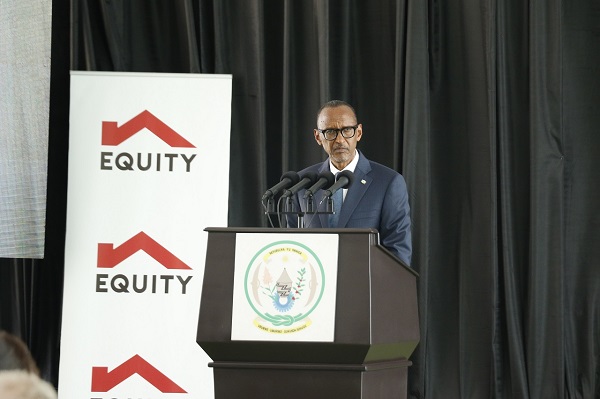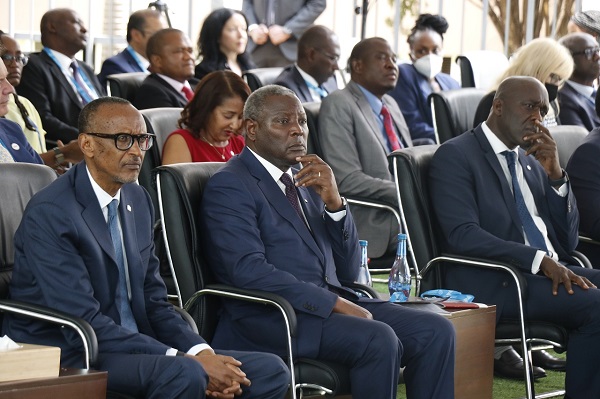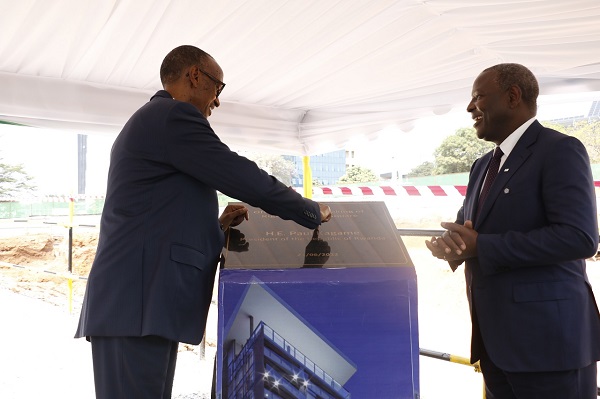President Paul Kagame of Rwanda presides over the launch of the Africa Recovery and Resilience Plan and one of the Plan’s Transformational Projects on the side lines of the Commonwealth Business Forum 2022
- The USD 6 billion Plan is stimulating the economic recovery of the continent along pillars of Agriculture and Extractives, Manufacturing and Logistics, Trade, and Investment, MSMEs, Social and Environmental Transformation and a Technology Enabled Environment
- 5 million businesses and 25 million individuals to access financing and capacity building over the next 5 years to expand their businesses and create 50 million jobs
- Targets to enable young people to create jobs – Young Africa Works Program
- Partnerships with National Governments, UN, Development Banks, Africa Union, Commonwealth and European Union, European Commission, and other like-minded partners
Thursday 23rd June 2022 Kigali…. President Paul Kagame yesterday presided over the launch of the Africa Recovery and Resilience plan and ground-breaking of one of the key transformational projects of the Plan. In Rwanda, flagship projects have already been delivered in the hospitality sector. Yesterday, the President toured a transformational project in the financial services sector that will serve as the hub for the regional financial services ecosystem: the Kigali International Financial Centre. Other flagship projects that Equity has supported include mining, infrastructure development, agro-processing, regional trade, among others.
President Kagame lauded Equity Group for supporting investments in Rwanda through financial intermediation by Equity Bank. He expressed the Government’s appreciation to all investors in Rwanda and gave them the assurance of the Government’s continued support by creating a conducive environment for investment and business.
The Kigali Financial Square, under the Rwanda Finance Limited Corporation seeks to position Rwanda as the preferred financial hub for investments into Africa and will play a key role in supporting the aspirations of the Africa Continental Free Trade Area (AfCFTA). The initiative, which meets world class infrastructure standards in being LEED certified, is aligned to the national priorities of the Government by developing the financial ecosystem supported by, among other factors, fit for purpose technology.
Speaking during the launch, Dr. James Mwangi, Equity Group Managing Director, and CEO said; “As the Eastern and Central Africa region recovers from the devastating health, social, humanitarian, and economic impacts of COVID-19, Equity Group is championing a private sector focused stimulus package to accelerate recovery and resilience in the region. The Plan targets financing of in-country manufacturing and regional supply chains to replace broken global supply chains following COVID-19 disruptions and the impact of the Russia/Ukraine war. This will build regional strength and capacity against future shocks while contributing to economic recovery and growth and in creating employment opportunities for young people and markets for local producers.
Clare Akamanzi, the Executive Director, and CEO of the Rwanda Development Board said, “Given that Rwanda envisions being an upper middle-income country by 2035 and a high-income nation by 2050, it requires taking bold steps to achieve this ambitious target. One such target is to diversify the financial sector and in so doing ‘catapult’ Rwanda, and Kigali in particular into the regional financial hub of choice. Creating a financial hub will enable Rwanda to accelerate its economic growth and go a long way in mobilizing innovative ways of raising financing to spur growth and developing a skilled and diversified labour pool. Key steps have been taken to achieve this goal including the passing into law of a robust and transparent legal and regulatory framework to support this ambition.”
The Plan strives to catalyse a social economic transformation of the region in a socially ethical and environmentally sustainable manner by resetting a recovery that builds back better. Being a purpose driven plan, inclusion is a centrepiece consideration to ensure nobody is left behind. The Plan is fully anchored on sustainability and governance.
The Equity Group Africa Recovery and Resilience Plan has won the support and participation of IFC, AfDB, European Development Banks (Team Europe), the Commonwealth Secretariat, the African Continental Free Trade Area Secretariat, the East Africa Community Secretariat, USAID, the United Nations, and the European Union, as well as alignment from the national governments of the six countries in which Equity Group operates. “We are grateful for the enthusiasm shown towards collaborating and partnering to jointly execute on the social and economic transformation of the Eastern and Central Africa region, particularly in mobilising USD 6 Billion in financing for the fund,” said Dr. Mwangi.
About the Africa Resilience and Recovery Plan
The Africa Recovery and Resilience Plan is aimed at catalysing a natural resources-led transformation of Africa, led by enhancing agricultural throughput, formalizing extractive value chains, and connecting these primary sectors to global supply chains that are broken and require diversification and secure sourcing.
Equity Group’s execution of the `Africa Recovery and Resilience Plan’ is underpinned by twin Social and Economic Engines that capacitates value chains (Social Engine) and provide holistic financial solutions to productive ecosystems (Economic Engine).
The Plan comprises 6 strategic pillars that ensure a systematic and holistic framework for execution:
- Ecosystems of natural resources in agriculture and extractives: more coordinated, connected, and capacitated supply chains and mechanization will drive higher throughput of raw materials and ultimately lead to a more inclusive industrialization of Africa.
- Manufacturing and logistics ecosystem: Africa has an opportunity to leverage off and expand existing productive capacities to industrialize by connecting to global value chains that are in the process of regionalizing and diversifying.
- Trade and investment: access to new markets, technology, capital, and skills will enrich and enhance offtake of African products and services
- MSMEs connectivity of small businesses into formal value chains will drive inclusive, broader, and more sustainable growth
- Social and environmental transformation: capacity building of value chain stakeholders, especially amongst smallholder farmers and MSMEs will drive productivity gains of African value chains
- Technology-enabled economy: online businesses will accelerate connectivity and velocity in ecosystems.
Objectives of the Plan by 2025 include:
- Inclusivity of 100 million online customers: Economic inclusion of more productive households and financially enable value chains
- Multiplier effect of 5 million borrowing businesses and 25 million borrowing consumers: borrowing businesses to expand productive capacities to drive value chain expansion and employment, whilst consumer borrowing to enable household aspirations
- Employment of 50 million: 25 million direct jobs to be created as businesses grow and a further 25 million indirect jobs created as value chains expand and deepen
- Additional private sector lending in excess of almost 2% of regional GDP: loan book to be directed to agriculture (30%), manufacturing (15%), MSMEs (65%)

President of the Republic of Rwanda H.E Paul Kagame addresses guests during the launch of the Africa Recovery and Resilience plan and ground-breaking of one of the key transformational projects of the Plan.

President of the Republic of Rwanda H.E Paul Kagame (left), Equity Group Managing Director and CEO Dr. James Mwangi (centre) and IFC Managing Director and Executive Vice President Makhtar Diop (right) follow proceedings during the launch of the Africa Recovery and Resilience plan and ground-breaking of one of the key transformational projects of the Plan.
About Equity Group Holdings
Equity Group Holdings Plc. is a systemic Pan-African financial services holding company listed at the Nairobi Securities Exchange, Uganda Securities Exchange, and Rwanda Stock Exchange. The Group has banking subsidiaries in Kenya, DRC, Rwanda, Uganda, Tanzania, South Sudan, and a Commercial Representative office in Ethiopia. It has other subsidiaries in investment banking, insurance, telecom, fintech and social impact investments.
Equity Group is the largest financial services institution in the region with assets of Kshs 1.35 trillion (USD 13.5 billion). It is also the biggest bank in deposits, market capitalization of USD 2 Billion and with a customer base of over 16.4 million customers. The Group has a footprint of 337 branches, 58,756 Agents, 155,888 Pay with Equity (PWE) Merchants, 34,941 POS Merchants, 691 ATMs and an extensive adoption of digital and mobile banking channels. The Banker Top 1000 World Banks 2021 index ranked Equity Bank 22nd in Africa and 761 overall in its global ranking, 149th in soundness (Capital Assets to Assets ratio), 71st in terms of Profits on Capital and 39th on Return on Assets.
Brand Finance 2022 ranked Equity Group the 5th strongest banking brand in the world and 338 overall among the top 500 banking brands, with a Brand Strength Index (BSI) of 90.8 and a brand ranking score of AAA+, the highest rating that a brand can attain.
The Banker’s Top 100 African Banks 2020 placed the Bank in position 7 overall among the top 10 Banks in Africa, 5th place on soundness, position 9 on growth performance, 8th on return on risk and position 6th in terms of profitability and on leverage category.
In the same year, Moody’s gave the Bank a global rating of B2 with a negative outlook, the same as the sovereign rating of the Kenyan Government due to the Bank’s strong brand recognition, solid liquidity buffers, resilient funding profile, established domestic franchise and extensive adoption of digital and alternative distribution channels.
People also viewed:
Equity Group Named Winner of CIO100 Awards, PlusOne Banking Sector Category
Naivasha, Kenya 3rd December 2025… Equity Group Holdings Plc has been named the winner of... Read more
Equity Group Foundation and UNDP Partner to Advance Innovation and Inclusive Growth for African Youth
The partnership will empower MSMEs and youth through the establishment of centers of excellence and... Read more
Equity Group Announces Strong Q3 2025 Results, Recording a 32% Growth in Profit After Tax Reflecting Strategic Transformation
Equity Bank Kenya bounced back in recovery with growth in profit after tax of Kshs.... Read more
EQUITY GROUP UNVEILS 2024 SUSTAINABILITY REPORT SHOWCASING MEASURABLE PROGRESS AND IMPACT.
Equity Group’s 2024 Sustainability Report, `A Sustainable World is a Transformed Africa’ showcases the continued... Read more


